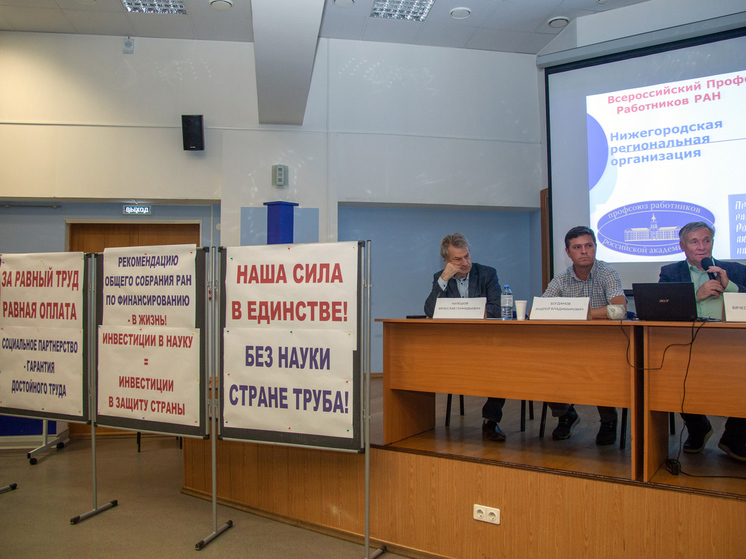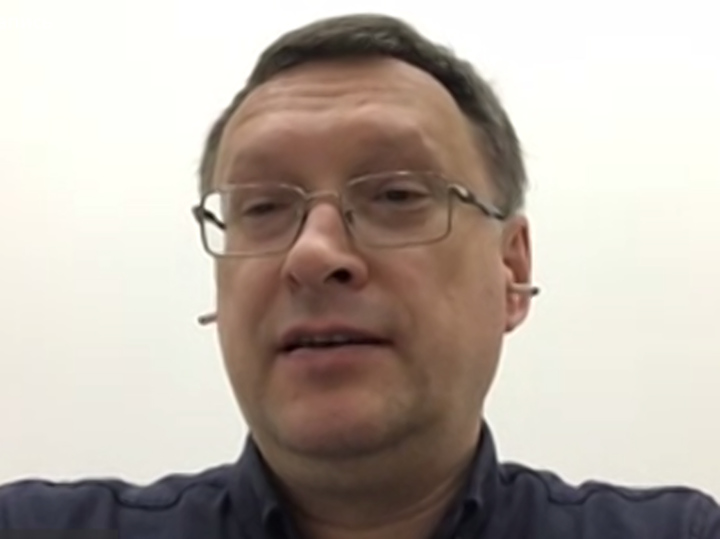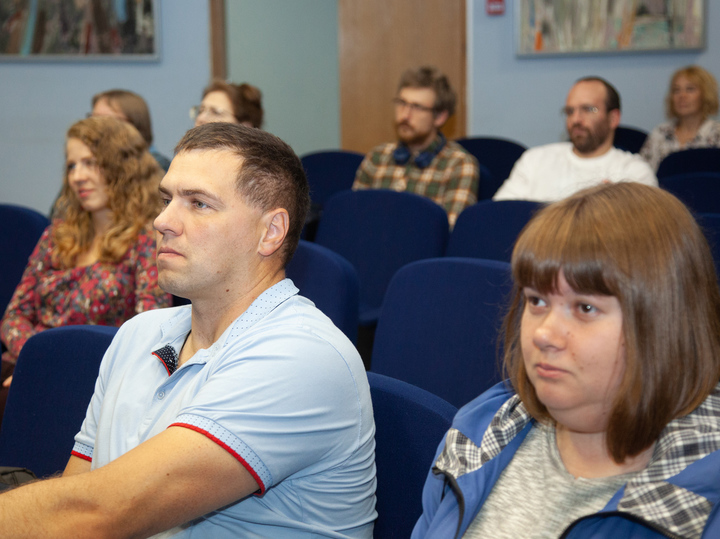The first zoom meeting of scientists was held in Nizhny Novgorod
The trade union of workers of the Russian Academy of Sciences on Thursday rallied against the budgetary funding of domestic science for the next three years that was too cut by the Ministry of Finance of the Russian Federation. The authorities, in this case the administration of Nizhny Novgorod, officially approved the rally, albeit in a new format — within the walls of a scientific organization. The MK observer, like other meeting participants from Moscow and other regions, took part in it via Zoom.
 The meeting of the trade union of RAS workers was held for the first time within the walls of the institute. Photo: NNRO, author S. Krotova
The meeting of the trade union of RAS workers was held for the first time within the walls of the institute. Photo: NNRO, author S. Krotova
The hall was provided by the Institute of Applied Physics of the Russian Academy of Sciences, where they were present “live” mostly local journalists and scientists. For the first time, Donetsk joined the scientific workers’ union via the Internet – he was represented by the deputy chairman of the trade union committee of the Donetsk Institute of Physics and Technology, Evgeniy Shemchenko.
The conversation at the zoom meeting, first of all, turned to the draft resolution on budgetary financing of fundamental science for the next three years – from 2024 to 2026. Last December, the budget for 2023-2025 was adopted. According to this document, in 2023 it was planned to allocate 253 billion rubles (0.169% of GDP) for fundamental science, and in 2025, oddly enough, significantly less – 232 billion rubles (0.136% of GDP).
In May, the general meeting of the Russian Academy of Sciences recommended that the government increase the amount of budget funding for fundamental science. In order to catch up over the next three years with 30 (!) countries that are far ahead in terms of the level of support for science (among them — Hungary, Greece, Latvia, Lithuania, Slovakia with 0.2-0.4% of GDP), the Academy considered it necessary in 2024, allocation of 415 billion rubles (0.26% of GDP) for fundamental research, in 2025 – 597 billion rubles (0.33% of GDP), in 2026 – 800 billion rubles (0.44% of GDP).
It may seem that in the current situation, when the country first of all needs money for essentials: drones, missiles, airplanes and effective means for oil production, asking for money for high science is illogical. Oddly enough, those who have the right to distribute finances usually like to focus their arguments on this, – an ironclad argument, in their opinion!
But the deputy chairman of the Trade Union of Workers of the Russian Academy of Sciences, Evgeniy Onishchenko, anticipating this argument in absentia, gave a convincing answer:
— The same turbines, airplanes and software that we once thought we could always buy are no longer being sold to us! The situation of an affordable supermarket is over, – in its confrontation with the global West, Russia must rely on its own strength. And in order to achieve technological sovereignty, which is much talked about from high stands, we must increase, not decrease, the number of researchers and the development work they carry out. For this, naturally, funding must increase.
They tell us: “Demand more money from business!” Business, of course, can be attracted, but in the case of fundamental research, it is not always ready to take risks without hoping for a 100% result. And the practice of strong powers shows that it is their governments that are the main investors in fundamental research. Moreover, investments in research and development are constantly growing all over the world.
In Europe, the USA, China and Japan, domestic spending on research and development exceeds 2% of GDP, reaching 3% for many. For more than 20 years now, this indicator has been at the level of 1% of GDP, that is, it lags two to three times behind developed countries. The same ratio applies to spending on fundamental science. The number of researchers in Russia (the only major industrialized country where there is such a trend) has decreased by about 50 thousand people over several years.
 Evgeny Onishchenko
Evgeny Onishchenko
So, if the financing of our Einsteins continues to be carried out on this residual principle, Russia, according to Onishchenko, may inevitably lose in the technological race.
By the way, by September, thanks to the common efforts of representatives of the Russian Academy sciences and its professional union, managed to convince the Ministry of Finance to slightly raise the level of funding for fundamental science for the next year, 2024: the government raised the bar from 253 billion rubles to 266 billion rubles.
According to Evgeny Evgenievich, the government met the scientists halfway after hundreds of appeals received this year to the authorities, the president from 27 (!) regions, including Donetsk.
— The whole country has risen – from Crimea to Kamchatka, from St. Petersburg to Vladivostok, – says the deputy chairman. – We have received a slight increase in funding, but spending on basic science in relation to GDP in 2024 will decrease to 0.148% of GDP. In 2025, it is planned to reduce spending on fundamental science to 239 billion rubles, that is, to 0.125% of GDP. According to this indicator, we will lag behind the most developed countries by 3-4 times!
Against this background, the level of support for Chinese science, which was described by:
— I was in the PRC in August, looks very contrasting. They really, as mentioned earlier, decided to prioritize mathematics and IT to create artificial intelligence; they invest two to three times more in science than we do. Our delegation was received by one of the Politburo members. The situation is this: they lure everyone to them, offering salaries higher than in the USA. And the people went to them…
Boris Sergeevich suggested that members of the RAS Trade Union analyze how many researchers have already left the country in recent years.
— According to my rough estimates, we have probably lost 10-15% percent. The trade union must convey to the authorities the danger of a careless attitude towards scientists, – said the academician.
 Participants of the rally. Photo: NNRO, author S. Krotova
Participants of the rally. Photo: NNRO, author S. Krotova
I was invited to the meeting of the trade union of RAS workers for the first time. He expressed great gratitude to his colleagues:
— We feel that we are finally together, we feel your support! — he said, addressing all those present and the leadership of Russian science.
According to Shemchenko, the DPR institutes have already been transferred to the Ministry of Education and Science of the Russian Federation (previously they belonged to the regional Ministry of Science of the DPR), all employees regularly receive salaries. But for now this is all support; next year Donetsk Physics and Technology is waiting for the promised update of the instrument base, the only way it will be able to attract young personnel to work.
After Shemchenko, employees of the Institute of Applied Physics of the Russian Academy of Sciences spoke, talking about the support that they are trying to provide both to refugees in the Northern Military District and to the military: they collect money for the most necessary things, weave camouflage networks. Nizhny Novgorod scientists called on employees of all scientific organizations in Russia to be more actively involved in the same work.
At the end of the meeting, the trade union of RAS workers, as expected, adopted a resolution regarding the financing of science. As the organizer of the event told us, the union intends to write a letter to President Vladimir Putin with a request to raise the funding of Russian science to the proper level. In addition, scientists decided to shift efforts towards deputies of the State Duma. Vdovin recalled that there are currently six deputies from the Nizhny Novgorod region working in the lower house of parliament.
– We are in constant dialogue with them, – after all, they have to adopt the state budget, that is, the proposals that the government has made. We will insist that deputies definitely vote for the amendments that the Russian Academy of Sciences will introduce – said Vdovin.


